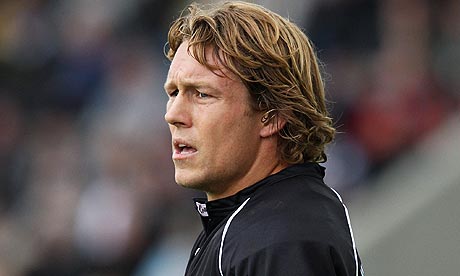
Not for the first time, Jonny Wilkinson's life feels like a soap opera. When the news of his dislocated knee came on the very same day that Danny Cipriani made his comeback, it felt like a scriptwriter's stretch too far. In winter though, Wilkinson's injuries are as inevitable as the shortening of the evenings. By my count this is his 15th since that day in 2003*. And again some pundits are predicting that Wilkinson won't be seen playing Test rugby again.
In another quirky concurrence his book, Tackling Life, is released today. Reading it makes me think that Wilkinson will be back, if just because he has more to offer English rugby now than he ever has done in the past. Through coping with everything his life has thrown at him since he reached the Beatles at Shea Stadium peak of his fame in 2003, he has matured into one of the most intelligent and thoughtful people in sport. His skills may be less adept and the returns may grow scantier (though they'd showed no sign of it this season), but he has accumulated so much knowledge and understanding.
How many sports stars can you think of who would be willing to talk openly about the effect reading about Schrodinger's cat had on their lives? "Quantum physics helped me to realise that I was creating this destructive reality and that all I needed to do to change it was to change the way I chose to perceive the world."
It sure makes a change from the tripe most players trot out in interviews and biographies. With most players the closest we get to a glimpse of a hinterland is when we see them prancing in lycra or gurning over a plate of food on Saturday-night primetime. And all the while Wilkinson has been spending his time overcoming his fears about his own mortality. "I couldn't figure out how to avoid death: it was like a game I could not win. The closer I got to family and friends and the better things got, the more I had to lose."
This is a man, you sense, who has spent his life looking for his own enlightenment. And he seems to have found it, something he never achieved in the meticulous obsession with perfection that characterised his early years. "I would trade all the immediate joy around me at that time for what would undoubtedly be an even greater, more worthwhile and lasting experience further down the line," he writes of his old self. "I did not intend to go laughing, joking, smiling and therefore wasting all my dream savings away."
Like many other members of the side who won the 2003 World Cup – Steve Thompson has said almost exactly the same thing – when Wilkinson did reach that "even greater, more worthwhile experience" that he had been working towards, he found himself overwhelmed by anti-climax. Hiding in rucks and behind sunglasses, his mindset seems to have reached a nadir at the very height of his personal and public achievement. "I felt," he writes in Tackling Life, "like I was tumbling out of control."
Finding the noise of his own thoughts drowned out by the roars of the adoring public around him, all those subsequent injuries have enabled Wilkinson to retreat into the quiet corners of his own mind, just as the Beatles ensconced themselves in the studio and refused to come out. He has emerged from the last five years as a stronger person, and in that sense as a better player too.
He is still terrifyingly obsessive, kicking the ball around 1,000 times a week. "Three-hundred place kicks, 250 punts with my right foot, 250 with my left, 120 drop goals, 120 restarts – that makes a total of about 1,000 kicks to prepare for just 20 [in a match]. That's near enough 50 rehearsals for each single defining event. To me that has been a totally acceptable ratio." But he has married the professional approach to mental stability. Most other people would have been broken by the Job-like string of misfortunes he's endured, but for Wilkinson you sense it has been the making of him.
It is easy to imagine him providing the kind of ballast for the England team that Mike Catt has in recent years. Catt had more than his fair share of traumas along the way too, and he grew into one of the shrewdest minds in the game. Wilkinson has seen it all, done it all and his wisdom would be all too welcome to a team that too often over the last five years has seemed to lack for leadership. With all the brouhaha about Cipriani, it is worth remembering that Wilkinson is an authentic great, one of the sport's finest players.
It is fair for pessimists (realists even) to speculate that his body is just too broken, that he will be unable to stay fit for long enough to play much. Yet he's not even 30, and mentally he's never been fitter. Until he decides to retire himself, he will always be worth a place in the England squad, as much as a mentor and leader as a player.
*The roll call: Shoulder, shoulder, shoulder again, haematoma, knee, medial ligament, shoulder, appendix, groin, abductor, knee, kidney, ankle, shoulder, and knee.

